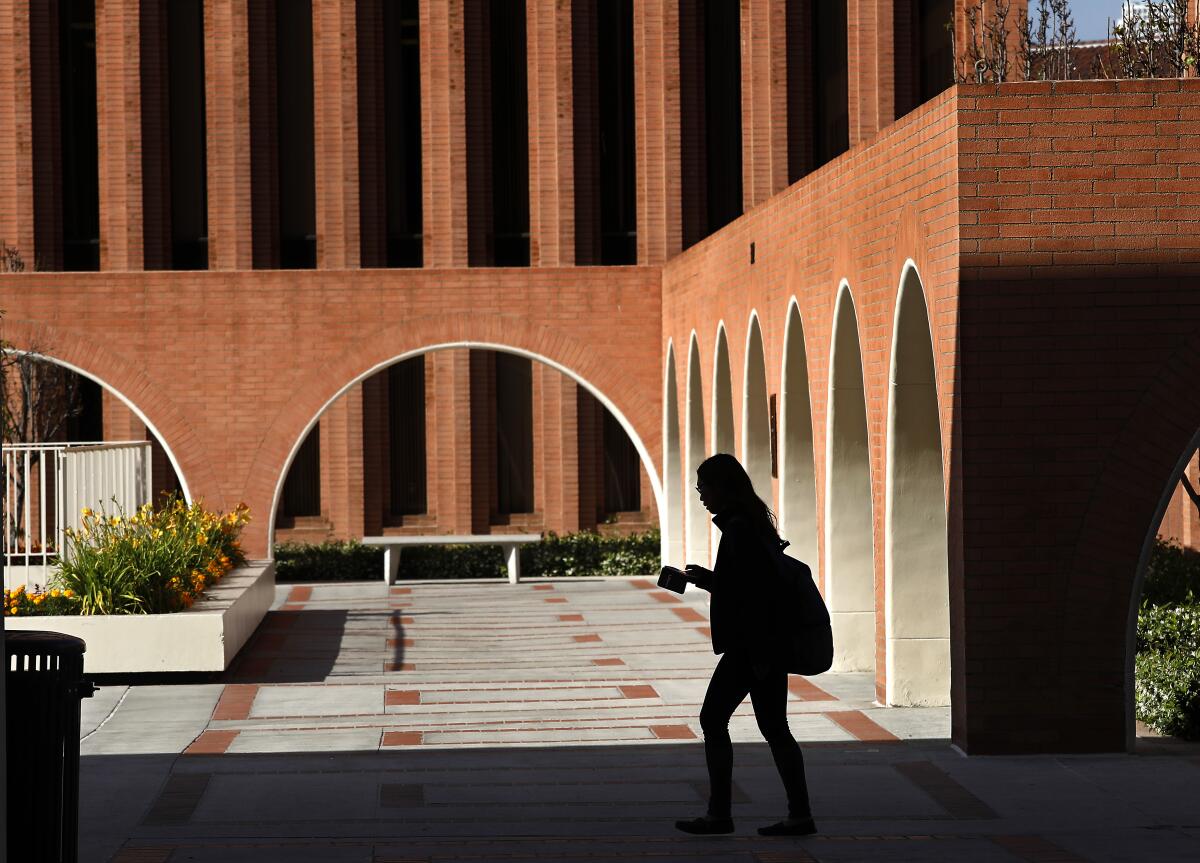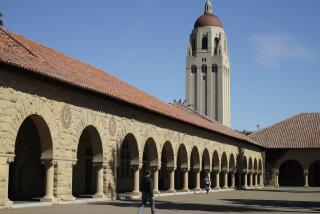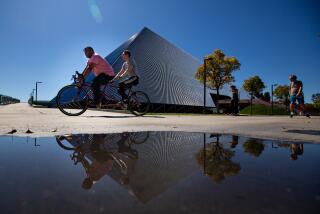In wake of scandals, USC radically cuts number of trustees, imposes age limits, pledges more diversity

USC trustees approved far-reaching changes to their governing board Tuesday aimed at reforming leadership weaknesses that prevented the private university from effectively handling a series of scandals over the last few years.
Trustees voted to dramatically reduce the board’s size, impose term and age limits, diversify membership and limit the ability of the university president and board chair to handpick members of the powerful executive committee.
For the first time ever, the unusually secretive USC board will publicly disclose membership on committees, including academic affairs and finance — a standard practice even among private institutions.
In addition, an independent board will be created to oversee the university’s $1.7-billion medical enterprise, which includes hospitals and clinics throughout the region.
“These are really big and meaningful changes,” said board Chairman Rick Caruso. “I’m very proud of my fellow trustees because change sometimes is a little bit difficult but we’re on a path to... allow the board to be more engaged, more authentic, require more accountability of the administration and really be more connected to the campus.”
However, decisions on whether to share meeting agendas, discussion highlights or actions taken during private meetings would be made on a “case-by-case basis,” said Caruso, a billionaire developer and USC alum who has pledged greater accountability and transparency since taking the helm in May 2018.
The reforms mark efforts to change an institutional culture that many believed was too insular and focused on fundraising as the university pursued ambitious growth. Caruso said trustees are aiming to shift to a culture of “open-mindedness, being inclusive and being open to learning.”
Officials said they hope the reforms will provide more diverse perspectives, innovative thinking and swift decision-making at a time of growing challenges and complexities not only at USC but across higher education.
In a letter to the USC community Tuesday, Caruso and fellow trustee Carmen Nava detailed what they called “significant and historic changes” to the university’s governance structure. Nava headed the board’s Special Committee on Governance Reform, which spent 14 months examining best practices at peer institutions and leading organizations across the globe, and spoke to faculty, staff, student and alumni leaders to understand their priorities and vision.
“USC has enjoyed great dramatic growth over several decades and the board really recognized it was time to evolve, to modernize itself,” Nava said. “It really needed to look critically at the current processes and design a new operating model to take us into the future.”
She said trustees began making small but significant changes some months ago to deepen their knowledge and engagement.
In the past, the board members — who include philanthropists, accomplished alumni, Hollywood insiders, director Steven Spielberg and L.A. Lakers owner Jeanie Buss — would gather every quarter for “a two-hour meeting of good news, lunch and go home,” Caruso said.
Those days are over. The board has lengthened meeting times and revised committee schedules to boost meeting attendance, Nava said.
Larry Gross, a communication professor and member of Concerned Faculty of USC, called the changes “significant progress.” But the board did not act on a key demand of some faculty — that professors and students be given seats on the governing board and committees. Faculty say that a disconnect between them and trustees prevented longstanding concerns from advancing more quickly to the board.
Caruso said the proposal to add faculty and students was still in discussion.
“I think that’s going to come down the road,” he said. “We’re still taking this in pieces. This is not going to be the end of the modernization that we’re doing. “
The reforms include:
- Reducing the board from 60 to 35 members, about the average size at most universities. The reductions will come over the next few years mainly through attrition and new term limits.
- Board members will be limited to three five-year terms. Currently there are no term limits. Also board members will age out at 75 for voting positions. Currently, the age limit is 80.
- The executive committee membership will be composed of immediate past and current board chairs, the university president and heads of board committees. This is designed to ensure that the most engaged and knowledgeable trustees are in key decision-making roles, Caruso said. Historically, the president and board chair have chosen members who were too often viewed as allies who rubber-stamped decisions. “If membership is through an independent process and it’s much more objective, you create a reporting and an accountability that wasn’t there before,” Caruso said.
- A commitment to diversify the board to include more women, racial and ethnic minorities and people of various socioeconomic classes.
- Reducing board committees from 11 to nine to increase efficiency and reporting.
Richard Chait, a Harvard University professor emeritus of education and expert in university governance, said many of the USC changes reflected best practices of leading universities. Large boards are usually a sign of appointments made principally for “philanthropic purposes” but tend to concentrate power among a select few and impede significant and strategic deliberations, he said.
He also said age and term limits are “inarguably, unquestionably considered best practices” and that if trustees resist tenure for faculty they should not insist on it for themselves.
But he cautioned that changing a university’s board structure goes only so far in reforming operations. He said what the board focuses on will be far more important — academic quality, student experience, federal research policy, merit or immigration, for instance.
“Ultimately the difference between effective or exemplary boards and ordinary or mediocre boards has very little to do with structure...” he said. “What matters is the substance of their work.”
Trustees began moving to reform the university in the last 18 months after scandals damaged its reputation. The university is facing about 700 civil lawsuits and has already brokered a $215-million federal class action settlement to compensate former patients of George Tyndall, a campus gynecologist who has pleaded not guilty to criminal sexual assault charges after being accused of sexual misconduct toward many USC students.
USC also has grappled with controversies involving a former medical school dean who was revealed to have used hard drugs and associated with criminals while in his post. In addition, USC has been at the center of a college admissions scandal in which wealthy parents are accused of paying to get their children admitted using fake profiles.
The multiple crises led then-President C.L. Max Nikias to agree to resign in May 2018. Trustees replaced him in July with Carol L. Folt, the former president of the University of North Carolina at Chapel Hill. She has moved to install key executives, including a new provost, and laid out priorities to help immigrant students, make USC more affordable and position the university as a leader against climate change.
Ariela Gross, a USC law and history professor who heads the Concerned Faculty group, said no reform is complete unless the board lives up to its commitment to release information about the independent investigation into the Tyndall matter. She was not mollified by Caruso’s explanation that faculty leadership has been briefed but USC legal counsel has advised the board to hold back on public disclosure of findings while litigation is pending.
“A university can’t be driven by liability concerns alone. We have a higher obligation to the truth, and to the health and well-being of our community,” Gross said.
William G. Tierney, a USC professor of higher education, said he wanted the board to lay out clear rules around donations — including what donors may expect for their contributions — and more directly engage faculty in crafting a strategic plan for university priorities.
Caruso vowed that trustees would reach out and listen to diverse perspectives as USC continues to evolve and grow.
“The message to everyone is that the university is moving forward at an even greater trajectory than in the past,” he said. “The modernization that we are taking on will certainly make us a better university. It will certainly make us more accountable... Not only is preventing bad behavior very important, how you respond to bad behavior and how quickly you respond is very important.”
More to Read
Start your day right
Sign up for Essential California for news, features and recommendations from the L.A. Times and beyond in your inbox six days a week.
You may occasionally receive promotional content from the Los Angeles Times.








